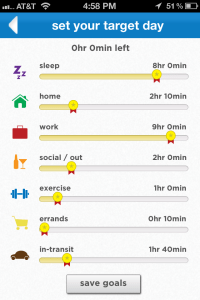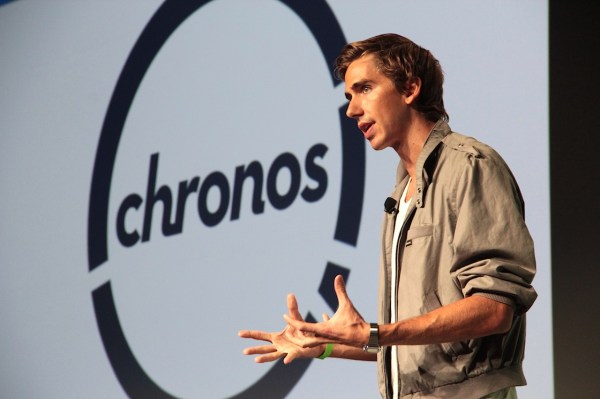Debuting at TechCrunch Disrupt SF 2012, Chronos is a new time-tracking application for iPhone that shows you how you spend your time as well as who you’re with, where and when, so you can set goals for yourself. Using the built-in sensors on the iPhone like the compass and accelerometer, for example, in combination with location databases from Google and Foursquare, Chronos can track whether you’re at the office, at home, at the gym, a restaurant, a bar, or anywhere else. The clever thing here is that the app tracks your activity passively by simply running in the background on the phone, then automatically categorizing the hours you log appropriately (“work,” “exercise,” etc.). You can also optionally connect with Facebook to compare your activity with select friends.
While the App Store is already filled with dozens of time-tracking applications, most of those are for the purpose of tracking the time spent on various work-related projects, which is something that people who charge customers by billable hours need to do. These apps tend to offer some sort of stopwatch-style interface, so they require user interaction to run. With Chronos, however, the idea is to have more of a “set it and forget it” type of experience when it comes to time-tracking. Plus, it’s meant for tracking time outside of work, too.
The concept for the application comes from recent Stanford Business School grads, Charlie Kubal, formerly of Pandora and Google, and Dylan Keil, a mechanical engineer who shifted over to the software side, who previously worked as a management consultant. “We realized that we had all these goals around how we wanted to be spending our time,” explains Kubal, “but we would get to the end of the day, and have this feeling of just kind of being exhausted and not having a great sense of where our time was going,” he says. “So we started to think about ways we could address this problem directly.”
With Chronos, users can quickly see a breakdown of where and how they spent their day, and also watch how that changes over the weeks or months. If connected to a Facebook friend in the app, users will also be able to mark when they’ve been spending time with that person. You’ll also be able to get a sense of where you are in comparison with others, by comparing the output in generalized categories like “work” or “sleep,” for instance.
 Chronos offers a slightly different angle on the personal goal-setting/habit-tracking space – aka the Quantified Self movement – which has also produced apps like Lift and Saga, for example. By offering a more holistic picture of how you’re really spending your days (and nights, too – Chronos knows when you sleep!) you can begin to challenge yourself to make changes. For example, if you want to exercise more or spend more time at home with your family, you can keep track of how well you meet those goals over the days and weeks ahead. A future version of the app will offer some subtle push notifications to keep you on track, by reminding you of your current progress or that you should leave work now in order to have time for the gym, perhaps.
Chronos offers a slightly different angle on the personal goal-setting/habit-tracking space – aka the Quantified Self movement – which has also produced apps like Lift and Saga, for example. By offering a more holistic picture of how you’re really spending your days (and nights, too – Chronos knows when you sleep!) you can begin to challenge yourself to make changes. For example, if you want to exercise more or spend more time at home with your family, you can keep track of how well you meet those goals over the days and weeks ahead. A future version of the app will offer some subtle push notifications to keep you on track, by reminding you of your current progress or that you should leave work now in order to have time for the gym, perhaps.
Based in Palo Alto, the founders are currently bootstrapping the app with their own money, but the eventual goal would be to monetize via lead generation. That is, if you tell the app that you want to spend more time with a friend, and the app knows where that friend lives, it could suggest nearby venues, events, experiences, and more. The app is currently available on iOS only, but an Android version is planned for the future. Sign up is here.
Judges Q&A – Gina Bianchini (Mightybell), Tony Conrad (True Ventures), Paul Davison (Highlight), Rich Wong (Accel Ventures)…
Q: What’s the mainstream moment?
A: Among significant others, it would be about figuring out the work / life balance. It reminds people that they’re not living the life they way they want to.
Q: Is it a utility or social product?
A: It’s a utility, but we make it so easy to use, so that it requires no work on the part of the user. The benefits it provides are worth it.
Q: Is the data public?
A: Only if you want it to be – if you connect with friends. (not by default)
Q: (OK, this one was not really a question, but a comment) You need to find a way to offer positive reinforcement to users to keep them coming back. For Quantified Self people, it works. If you aren’t able to give positive feedback, worry that people wil fall off from checking back in.
A: In the future, a friend could message you “great job.”
Q: How to measure people working at home?
A: It’s a real challenge. Eventually, aggregate data from other data collectors.
